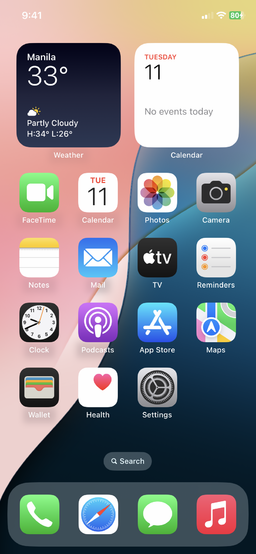iOS
 | |
 | |
| Developer | Apple, Inc. |
|---|---|
| Source model | Closed source (with open source components) |
| Initial release | iPhone OS 1 (29 June 2007) |
| Latest release | iOS 18.4.1 (22E252) (16 April 2025) |
| Latest preview | iOS 18.5 (22F5053f) (14 April 2025) |
| Supported platforms | ARM32 (prior to iOS 11) ARM64 (as of iOS 7) |
| Kernel type | Hybrid (XNU) |
| User interface | Cocoa Touch |
| License | Proprietary (with open source components) |
iOS is a series of mobile operating systems developed by Apple for their mobile device platforms (iPhone, iPad, and iPod Touch). It was formerly called iPhone OS and introduced alongside the 1st generation iPhone. The name stayed until the release of the iPad in early 2010 when Apple rebranded it to iOS. In 2019, Apple began to use the iPadOS moniker to brand the version of the operating system used on iPad devices.
iOS is based on the codebase of macOS, formerly OS X, and shares the same kernel, filesystem, and binary formats. The userland of iOS is like that of macOS, but with a mobile-friendly design that is touchscreen and content-centric. It lacks direct access to the filesystem and is unable to run arbitrary code by default. The only distribution method for software officially allowed on iOS is the built-in App Store.
The userland consists of a home screen (known as SpringBoard internally) that manages the user's applications. Many applications from macOS exist in iOS and vice-versa.
Since the release of iOS 11 in 2017, iOS has only been compiled for 64-bit ARM-based processors. Since the release of iOS 16 in 2022, iOS has only been compiled for iPhone models.
No official emulator that can run the retail version of iOS exists. However, Apple provides the iOS Simulator with Xcode, which runs a modified build of iOS with output in a dedicated window. Unofficial emulators like Corellium and QEMU-T8030 can emulate iOS to an extent. There is also an open source fork of QEMU[1] that can emulate a 1st generation iPod Touch on iPhone OS 1.1, and a 2nd generation iPod Touch on iPhone OS 2. There is also an open source high level emulator named touchHLE that can run iPhone OS 2-3.0 games.
Timeline[edit | edit source]
| Name | Darwin version | Codename | Release date | Notes |
|---|---|---|---|---|
| iPhone OS 1 | 9.0 | Alpine (iPhone OS 1.0) SUHeavenlyJuly (iPhone OS 1.0.1 - 1.0.2) Snowbird (iPhone OS 1.1 - 1.1.1) Oktoberfest (iPhone OS 1.1.2) Little Bear (iPhone OS 1.1.3 - 1.1.5) |
June 2007 | First version of iOS |
| iPhone OS 2 | 9.3.1 | Big Bear (iPhone OS 2.0 - 2.0.2) Sugar Bowl (iPhone OS 2.1 - 2.1.1) Timberline (iPhone OS 2.2) SUTimberline (2.2.1) |
July 2008 | First version of iOS to include App Store |
| iPhone OS 3 | 10.0 | Kirkwood (iPhone OS 3.0 - 3.0.1) Northstar (iPhone OS 3.1 - 3.1.2) SUNorthstarTwo (iPhone OS 3.1.3) Wildcat (iPhone OS 3.2 - 3.2.2) |
June 2009 | First version of iOS to work on the iPad |
| iOS 4 | 10.3.1 | Apex (iOS 4.0 - 4.0.2) Baker (iOS 4.1 - 4.1.1) Jasper (iOS 4.2 - 4.2.4) Phoenix (iOS 4.2.5 - 4.2.10) Durango (iOS 4.3 - 4.3.5) |
June 2010 | |
| iOS 5 | 11 | Telluride (iOS 5.0 - 5.0.1) Hoodoo (iOS 5.1 - 5.1.1) |
October 2011 | |
| iOS 6 | 13 | Sundance (iOS 6.0 - 6.0.2) Brighton (iOS 6.1 - 6.1.6) |
September 2012 | Final version of iOS to include the skeuomorphic UI |
| iOS 7 | 14 | Innsbruck (iOS 7.0 - 7.0.6) Sochi (iOS 7.1 - 7.1.2) |
September 2013 | First version of iOS to bring 64-bit ARM support |
| iOS 8 | 14 | Okemo (iOS 8.0 - 8.0.2) OkemoTaos (iOS 8.1 - 8.1.3) OkemoZurs (iOS 8.2 - 8.2.1) Stowe (iOS 8.3) Copper (iOS 8.4 - 8.4.1) |
September 2014 | |
| iOS 9 | 15 | Monarch (iOS 9.0 - 9.0.2) Boulder (iOS 9.1 - 9.1.1) Castlerock (iOS 9.2 - 9.2.2) Eagle (iOS 9.3 - 9.3.1) Frisco (iOS 9.3.2) Genoa (iOS 9.3.3 - 9.3.6) |
September 2015 | |
| iOS 10 | 16 | Whitetail (iOS 10.0 - 10.0.3) Butler (iOS 10.1 - 10.1.1) Corry (iOS 10.2 - 10.2.1) Erie (iOS 10.3 - 10.3.1) Franklin (iOS 10.3.2) Greensburg (iOS 10.3.3 - 10.3.4) |
September 2016 | Final version of iOS with 32-bit ARM support |
| iOS 11 | 17 | Tigris (iOS 11.0 - 11.0.2) Bursa (iOS 11.1 - 11.1.2) Cinar (iOS 11.2 - 11.2.2) Dalaman (iOS 11.2.5 - 11.2.6) Emet (iOS 11.3 - 11.3.1) Fatsa (iOS 11.4) Gebze (iOS 11.4.1) |
September 2017 | |
| iOS 12 | 18 | Peace (iOS 12.0 - 12.5.7) | September 2018 | |
| iOS 13 | 19 | Yukon (iOS 13.0 - 13.7) | September 2019 | First version to use the iPadOS moniker on iPad devices |
| iOS 14 | 20 | Azul (iOS 14.0 - 14.8.1) | September 2020 | |
| iOS 15 | 21 | Sky (iOS 15.0 - 15.8.4) | September 2021 | Final version of iOS to support the iPod touch platform |
| iOS 16 | 22 | Sydney (iOS 16.0 - 16.7.11) | September 2022 | |
| iOS 17 | 23 | Dawn (iOS 17.0 - 17.7.6) | September 2023 | |
| iOS 18 | 24 | Crystal (iOS 18.0 - 18.5) | September 2024 |